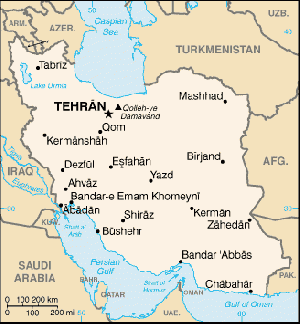Map of Iran
The enmity that has existed between the U.S. and Iran may be coming to an end.
That may seem like blasphemy to the likes of Senator's John McCain and Lindsey Graham, Prime Minister Benjamin Netanyahu and the Israeli government, the American Israeli lobby led by AIPAC and of course Saudi Arabia that bastion of Sunni autocracy, Islamic fundamentalist Wahhabism and financial underwriter of Sunni extremists in Syria, Iraq, Lebanon as well as Sunni extremists in Russia.
But this crowd mentioned above is increasingly being marginalized by facts on the ground which continued demonization of Iran does nothing to quell the fanaticism of Sunni radical jihadists in the Syrian civil war, in the Sunni Iraqi cities of Fallujah and Karbala in Iraq's Anbar province (adjacent to Syria) and in Lebanon.
Shiite Iran is the primary supporter of Syrian President Bashar al-Assad and his Alawite Shiite sect, the Shiite led government in Iraq and Shiite Hezbollah in Lebanon.
The sectarian rift between Sunni Muslims and Shiites is such that the civil war in Syria is threatening to spread to Iraq and Lebanon.
Though Bush's invasion and occupation of Iraq in 2003 was the catalyst that unleashed the sectarian hatreds in that country and spread into Syria, it is now in the interests of the U.S. to expand diplomacy with Iran well beyond concern over that countries nuclear program and embrace Iran as a partner in helping to restore stability to the region.
First and foremost Iran wants stability in neighboring Iraq, Syria and Lebanon and exerts great influence in the Shiite led governments of Iraq and Syria as well as Shiite Hezbollah in Lebanon. Add in the coming U.S. withdrawal from Afghanistan by the end of this year and considering Iran's influence and alignment with Afghans that oppose the Taliban and that groups potential ascendency to again regain power once the Americans leave the country, it seems obvious to be in U.S. interest to work with Iran in support of Afghans who would resist a Taliban takeover.
And lately we have seen the indigenous Sunni militia's in Iraq, though antagonistic to the Shiite government, increasingly siding with the government as the lesser evil and fighting against the Sunni extremists who have been indiscriminately killing Shiite and Sunni alike.
On Sunday, even Secretary of State John Kerry acknowledged Iran could play a role in the upcoming Syria peace talks in Geneva, Switzerland scheduled to begin on January, 22.
However serious obstacles remain to be reconciled as these talks are conditioned that Syria's Assad step down and hand over power to a transitional body which is highly unlikely. Also for Iran to participate in the talks it must agree to this condition; an unlikely to occurrance.
But the recognition that a stable Iran could be an important diplomatic partner in an increasingly unstable Middle East is becoming all too apparent to the Obama administration.
The administration recognizes there is little trust of American motives or intentions by all sides in the entire Middle East and sees Iran could be an important diplomatic interlocutor i.e., Iran to the rescue ala Vladimir Putin.
How's that for irony.






